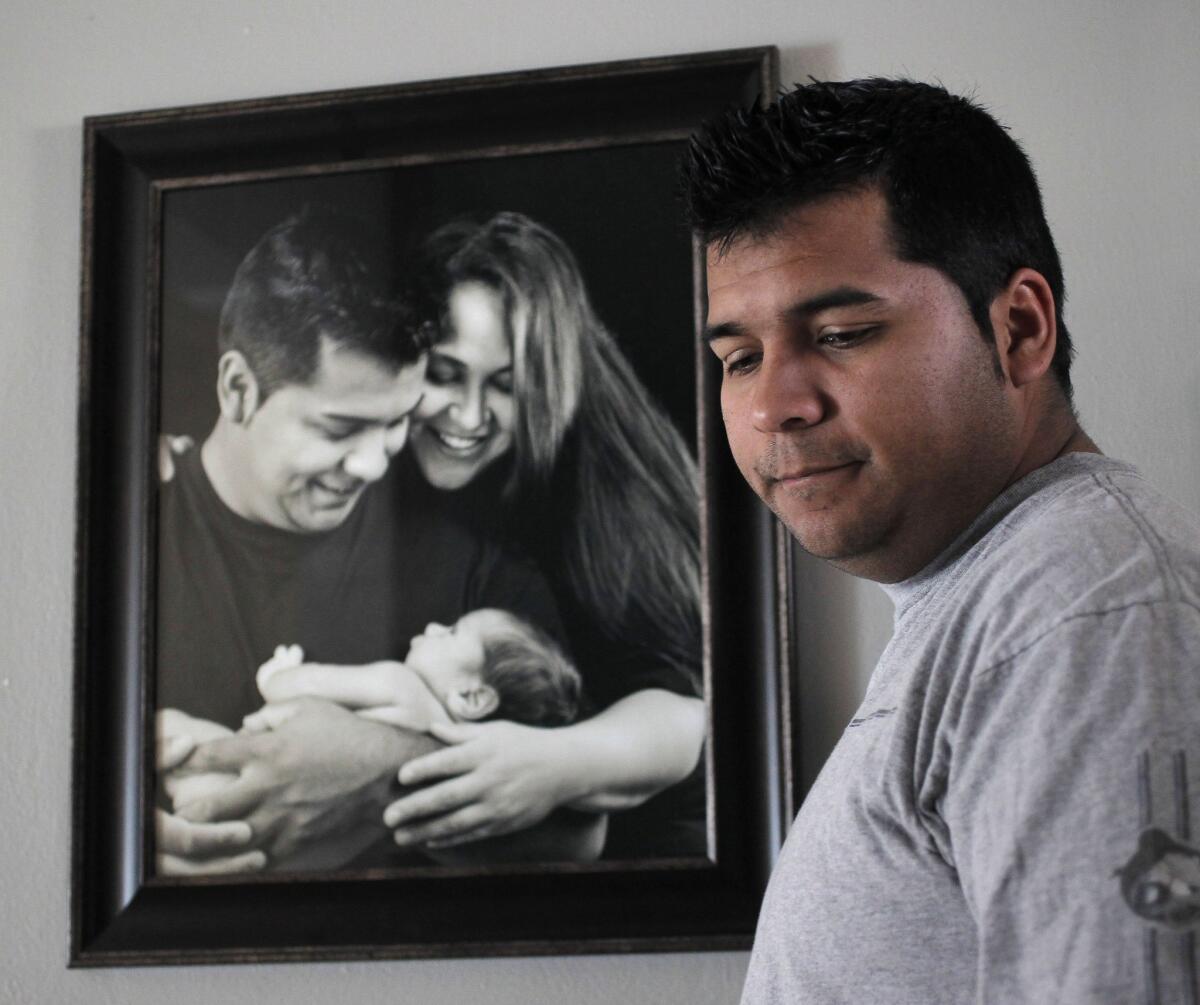Case of brain-dead pregnant woman goes to Texas court

- Share via
The husband of a brain-dead, pregnant woman filed papers in court Tuesday, accusing a Texas hospital of “cruel and obscene mutilation of a deceased body,” and demanded that his wife be removed from a ventilator immediately.
Erick Munoz, who found his wife, Marlise, collapsed on their kitchen floor on Nov. 26, has accused John Peter Smith Hospital in Fort Worth of misinterpreting a state law that prohibits hospitals from suspending “life sustaining treatment” on patients who are pregnant, according to the filing.
“Marlise cannot possibly be a ‘pregnant patient’ -- Marlise is dead,” Munoz’s attorneys, Heather King and Jessica Hall Janicek, declared in the filing.
“Erick Munoz vehemently opposes any further medical treatment to be undertaken on the deceased body of his wife,” they wrote.
The heart-wrenching case is one of two that have made recent national headlines as family members argue with hospital officials over the definition of death.
RELATED: Marlise Munoz: Can a fetus survive after mother becomes brain-dead?
In Oakland, the family of 13-year-old Jahi McMath fought to keep the girl’s body connected to a ventilator even though officials at Children’s Hospital & Research Center determined the girl had no “cerebral activity.”
After extensive negotiations, the girl was released to the family, and she is now at an undisclosed facility, according to their attorney.
In the Texas case, 33-year-old Marlise Munoz was 14 weeks pregnant when her husband found her unconscious and administered CPR before calling 911. It remains unclear what happened to her, but the family suspects she suffered a blood clot in one of her lungs.
The couple, both paramedics, were knowledgeable about severe injuries and brain death, and frequently discussed their desire not to be resuscitated should either of them become brain-dead, their lawyers said.
“Despite the fact that Marlise is dead, JPS refuses to remove Marlise from the ‘life-sustaining’ treatment, thus mutilating, disturbing and damaging Marlise’s deceased body, and further refusing to release it to Erick for proper preservation and burial,” the lawyers argued in court documents.
The hospital has made no public announcement regarding the state of Munoz’s brain functioning.
But Erick Munoz said in court documents that he was informed by doctors that his wife had suffered brain death, and that he had also seen “brain death” written on his wife’s medical chart.
The hospital declined to comment on the filing Tuesday and referred questions to the Tarrant County district attorney’s office, which also declined to comment, according to the Associated Press.
In previous statements, hospital spokeswoman J.R. Labbe said the hospital was standing by its decision and was following the law.
“The courts are the appropriate venue to provide clarity, direction and resolution in this matter,” Labbe said last week in a news release. “JPS remains focused on providing compassionate care to all patients while also following the law as it applies to healthcare in the state of Texas.”
The state law at issue, Texas Health and Safety Code Section 166.049, states that “a person may not withdraw or withhold life-sustaining treatment under this subchapter from a pregnant patient.”
RELATED: Q&A: Can brain death be reversed?
Alexander Capron, professor of law and medicine at the Keck School of Medicine of USC, said it remained to be seen whether or not the hospital had made a determination of death based on a lack of neurological activity.
If it has, then hospital officials are misreading the law, Capron said. “It wasn’t written to be applied to a corpse,” he said.
But if the mother is not brain-dead, the matter amounts to a constitutional law case, Capron said.
“The husband has made allegations that it’s both a deprivation of due process and equal protection, that she’s being treated differently than non-pregnant patients,” Capron said.
Cases like those involving Munoz and Jahi McMath often inspire confusion among the public because they invoke the term “brain-dead,” which is not used in any state law involving a determination of death.
Using the term suggests that there are different kinds of death, Capron said, when in fact neurological function was being used as a measure to determine whether an entire organism was dead.
“I hesitate to use the term brain-dead because it is such an awful term. It confuses the hell out of a lot of people,” Capron said. “Brains don’t die; people die.”







